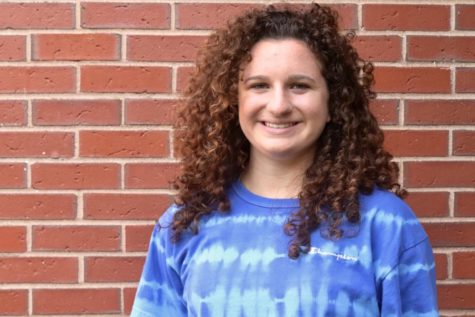Self-Isolation and Mental Health: COVID-19 furthers anxiety
Credit: Owen Smith
With WHS approaching its eighth week of quarantine, students are beginning to feel more stressed, anxious and depressed. Reporters Taylor McGuire and Caterina Tomassini talk with fellow students to learn more about mental health and quarantine.
May 5, 2020
Now that members of Wayland High School have been quarantined for over a month, many are starting to grow restless, bored or tired of the constant self-isolation. Although some are finding ways to entertain themselves through exercise, baking or art, many are finding themselves struggling with their mental health.
Freshman Kaya Oleson notes that she struggles with severe anxiety and an undefined depressive mood disorder. Being quarantined with little to no schedule, Oleson has noticed that her mental health has declined.
“From what I’ve seen and heard from others, most people aren’t dealing with [quarantine] very well,” Oleson said. “Personally, [my] mental health has been very negatively affected by the social distancing order.”
Like many other students, Oleson feels that since quarantine has begun, her mental health has worsened. According to a WSPN survey of 126 students, 46.8% of respondents also said that their mental health has decreased significantly since quarantine.
One anonymous junior notes that, throughout the school year, she’s been busy enough to focus on other aspects of her life, leaving her little time to think about her mental state. Now that she has spent nearly seven weeks without extracurriculars or schoolwork, her mental health has been a more prominent issue in her daily life.
“This has been really weird for me because now I have all the time to notice my mental health and be present with myself, which is something I’m definitely not used to,” the anonymous junior said.
WHS students are completing approximately three hours of schoolwork per day, a workload much lighter than that of a normal school day. A handful of students are enjoying a seemingly less stressful lifestyle, but others need stress from school in order to be motivated and to stay focused. The anonymous junior notes that stress from schoolwork is a distraction from depression, and even helps her to push through the day.
“I’m not as stressed about school, which is nice, but at the same time I need the stress from school and activities to keep me moving,” the anonymous junior said.
Due to her anxiety, Oleson said that watching the news during the COVID-19 pandemic can be frightening for her and has long-lasting mental effects.
“Recently with my anxieties surrounding the current world events, I do my best to avoid the news,” Oleson said.
According to the WSPN survey, 27.3% of students said that anxiety is the most prominent mental health disorder affecting their daily routines. Of the surveyed students, 38.4% said that the inability to see friends was most affecting their mental health.
“Being able to see friends helps me feel more stable with my anxiety because they have all seen me at my worst, so they know how to help calm me down and cheer me up,” an anonymous freshman said. “Being unable to see them has left me a little depressed and stressed about how I can stay close with them.”
Along with anxiety and an undefined depressive mood disorder, Oleson notes that she does not have a healthy relationship with food, and being home with only certain foods has challenged her relationship with eating.
“I also have an unhealthy relationship with eating that, with the lack of availability of specific foods that I feel comfortable eating and high stress, has also gotten more severe,” Oleson said.
Some WHS students who struggle with mental illness visit a therapist to share their feelings and gain support. However, with most therapy sessions being conducted online, some feel that they aren’t able to express themselves as easily as they would in person.
“I usually go to therapy, but it’s over Zoom now, which is really weird for my brain,” the anonymous junior said. “It’s hard to have therapy in your own house when you feel like everyone can hear you. It’s more difficult to actually open up.”
While many students feel trapped at home, some are finding new ways to ease their minds and pass time while in quarantine. For both Oleson and the anonymous junior, art serves as a distraction during these unprecedented times.
“Art can be an escape, as it’s something to focus on other than how things are in the moment,” Oleson said. “It’s also always fun to expand my skills and watch myself progress.”





![Last Wednesday, the Wayland School Committee gathered to discuss a number of topics regarding the health curriculum and Innovation Career Pathway course. Another large topic of conversation was the ways to potentially mitigate distracting cell phone usage. "These [phones] are going to distract your learning and social relationships," Superintendent David Fleishman said. "That's concrete right there."](https://waylandstudentpress.com/wp-content/uploads/2025/06/Screenshot-2025-06-04-at-9.49.31 PM-1200x886.png)



























![Troy Hoyt finishes the Boston Marathon, running for the Hoyt Foundation. T. Hoyt is the son of Hoyt Foundation CEO Russ Hoyt.
“[Running a marathon] might seem like a big thing, when it’s presented to you at first, but if you break it up and just keep telling yourself, “Yes, you can,” you can start chipping away at it. And before you know it, you’ll be running the whole 26 miles, and you won’t even think twice about it.” T. Hoyt said.](https://waylandstudentpress.com/wp-content/uploads/2025/04/C36E8761-1CBB-452E-9DF2-543EF7B1095E_1_105_c.jpeg)















































